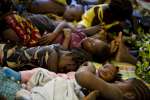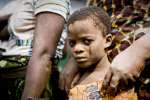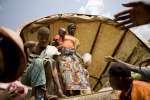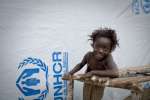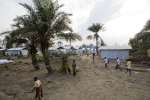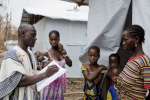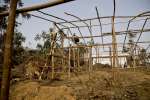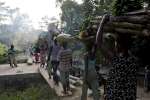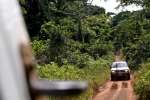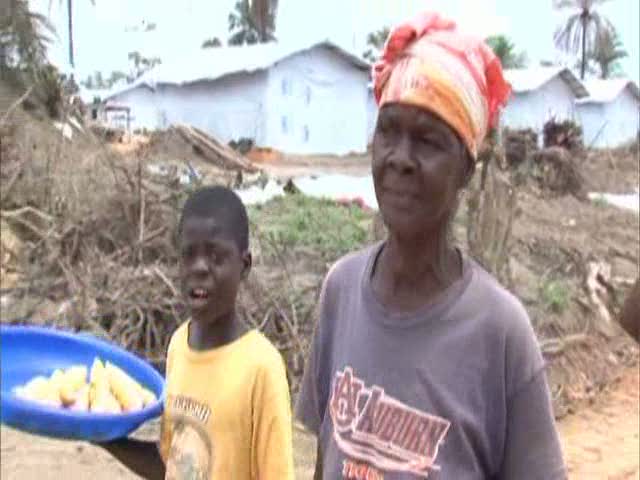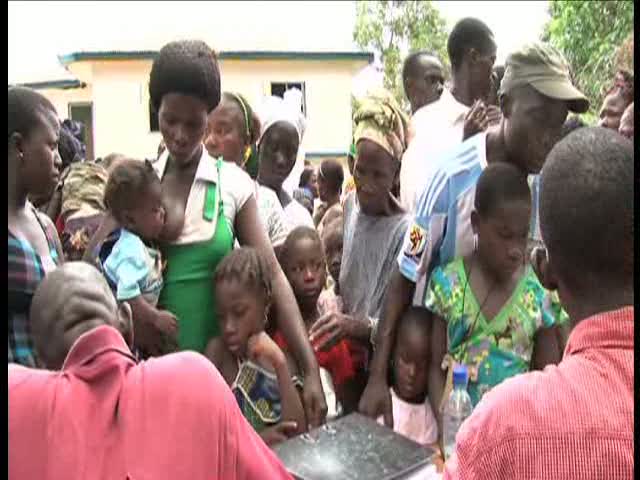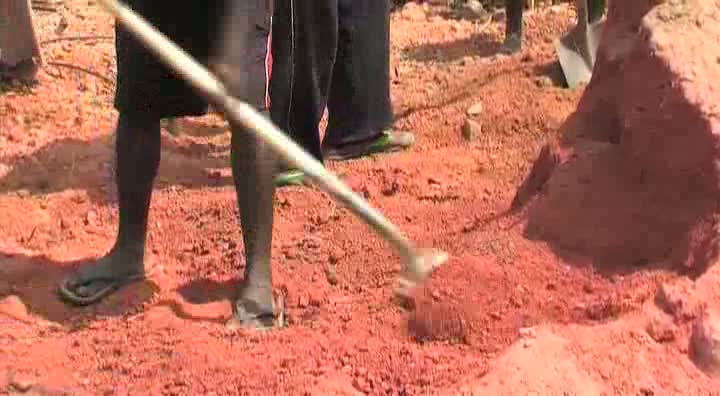- Text size
 |
|  |
|  |
| 
- Français
Ebola awareness and prevention activities under way for refugees in Liberia
News Stories, 23 October 2014
BAHN REFUGEE CAMP, October 23 (UNHCR) – Once every week or two, a group of almost 20 volunteers parades through eastern Liberia's Bahn Refugee Camp, singing songs and carrying banners. They may look like a song and dance troupe, but they carry a simple message that could save lives.
House by house, block by block, they knock on doors and tell the families inside: "Wash your hands." It's vital advice in one of the countries hardest hit by the killer Ebola virus, and a part of the country where it is difficult to spread awareness and information about the spread of the disease because of the tough terrain and poor communications networks.
To date, Liberia's Health Ministry has monitored more than 4,740 suspected, probable or confirmed cases of Ebola and over 2,700 deaths in a country of more than 4 million people. Some 38,000 Ivorian refugees live in Liberia, most of them in camps like Bahn in Nimba County. To date, seven refugees are known to have died from the disease in Liberia, all of them living in urban or rural areas.
The UN refugee agency was in the middle of a voluntary repatriation campaign targeting the Ivorian refugees when Ebola struck Liberia last March. Now, the border between Liberia and Côte d'Ivoire is closed and UNHCR has refocused its efforts on targeted prevention and preparedness activities for refugees in the countries affected by Ebola.
These include ensuring that refugees are included in national response plans, and that activities involving refugees are done in coordination with partners and local authorities. They also include social mobilization and community-based awareness campaigns to help reduce the risk of propagation of the disease.
UNHCR partners such as Care International have conducted numerous Ebola awareness and prevention activities at Bahn and two other refugee camps in eastern Liberia, where nearly 75 per cent of the refugees reside.
Hygiene kits, including buckets, chlorine and soap, and education on how to use them, have been provided to every refugee household. Hand washing has become a prerequisite to entering any of the camps, and thermometers are used to monitor people for early symptoms. Anyone with a high temperature is barred entry and referred to a community care centre.
Patients exhibiting Ebola-like symptoms are quarantined for observation and treatment of symptoms in these care centres while awaiting a diagnosis. All of the country's refugee camps have developed community care centres with strict attention to hygiene and sanitation practices, under the watchful eye of UNHCR and its health partner, Medical Teams International. Patients in the centres are separated from one another and staff wear protective suits.
Patients who are classified as suspected or probable Ebola cases are moved by ambulance to one of the country's growing number of Ebola treatment units, while those free of the virus are referred to the refugee camp's medical clinic for further help.
UNHCR Representative in Liberia Khassim Diagne said that while the incidence of Ebola in eastern Liberia had been relatively low compared to Monrovia, vigilance was required to keep the camps free from the virus. Grand Gedeh and Maryland counties, which both host refugee camps, have not recorded many Ebola cases, but the virus is becoming a greater threat in Nimba, which had 265 suspected, probable and confirmed cases as of mid-October.
"These are extraordinary times in Liberia requiring extraordinary measures," Diagne said. "Until voluntary repatriation resumes, together with its partners, UNHCR needs to keep the refugees safe and healthy," he added.
UNHCR has been supporting the Liberian government in its response, especially in areas hosting Ivorian refugees. The agency has provided funding support and vehicles as well as drugs and medical supplies for hospitals in Nimba, Grand Gedeh and Maryland.
The refugee agency has also been assisting the more than 500 refugees living in Monrovia. Ebola prevention messages are widely disseminated in the capital, but they are delivered almost exclusively in English, raising fears that the messages might not be reaching the French-speaking Ivorian refugee community.
In response, UNHCR implementing partner Special Emergency Activity to Renew Children's Hope has educated some urban refugees in French about Ebola and asked them to spread awareness among others and refer suspected cases to the government or Médecins Sans Frontières-run treatment centres.
By Carol Rowe in Bahn Refugee Camp, Liberia


